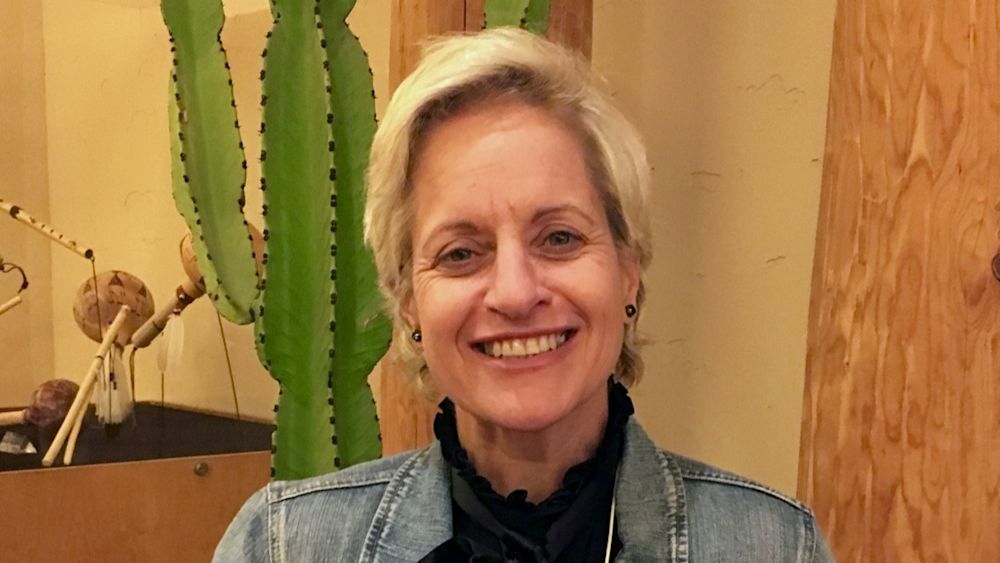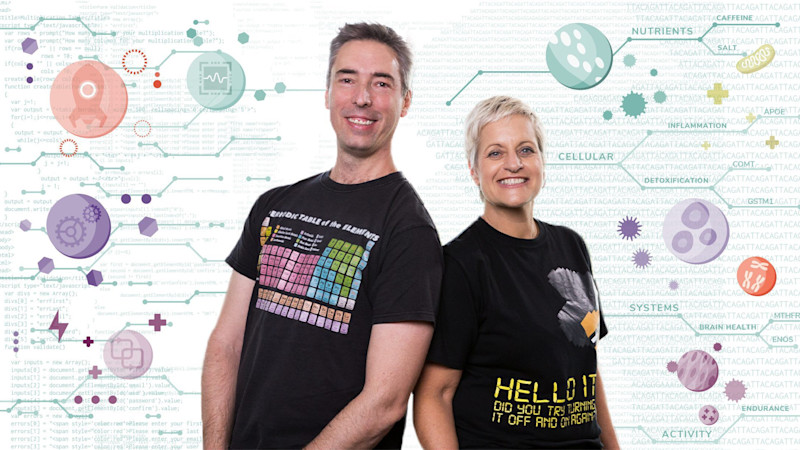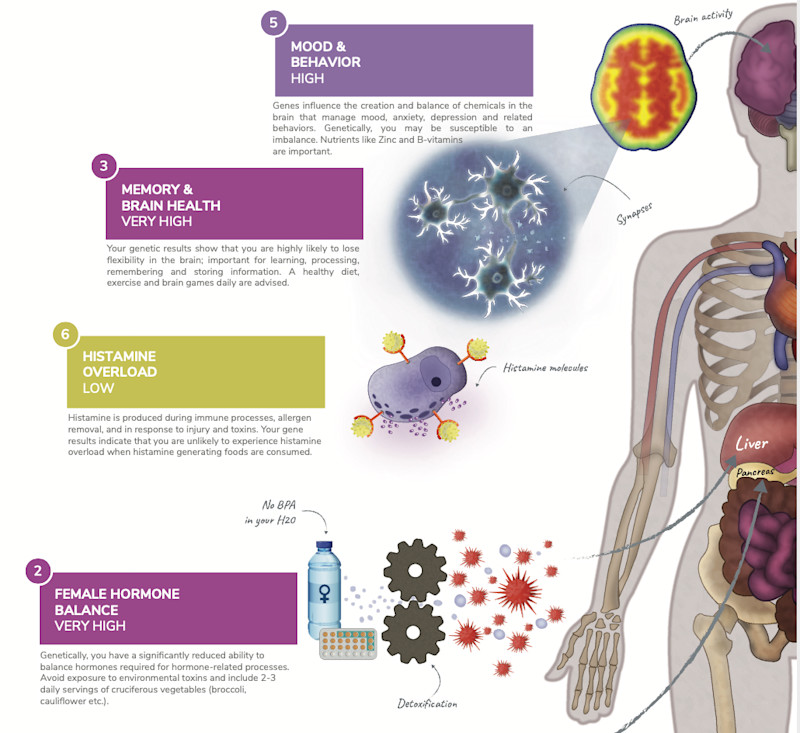- Iterate
- Meet The Team
- Why This South African Scientist Believes the Future of Nutrition is in Genetics
Why This South African Scientist Believes the Future of Nutrition is in Genetics
The Org met with Dr. Yael Joffe to discuss her 30-year journey to becoming one of the world's leading experts in nutrigenomics.

The Org met with Dr. Yael Joffe on a sunny February day in Cape Town to discuss her 30-year journey to becoming one of the world's leading experts in nutrigenomics, catching her before she relocates in a few months. The co-founder and Chief Science Officer at 3x4 Genetics, Joffe is heading to Seattle to expand the B2B genetics-based foundational health service into the U.S. market.
3x4 Genetics works with a global network of health practitioners to provide genetic tests that establish the relationship between a patients’ genetic composition, lifestyle, and diet, allowing practitioners to make stronger and more holistic recommendations to their clients. They also provide nutrigenomic education to a growing network of general practitioners.
Joffe’s crystal blue eyes lit up when given a compliment about a recent she was featured in to talk about all things nutrigenomics - the body of knowledge explaining the relationship between genomics and nutrition that helps people make better health decisions. Her motivation to get into the field emerged in 1988, when her grandmother was diagnosed with cancer, leaving her family perplexed by how little that could be done to help her live longer or to understand the disease’s root cause. These were the issues that led Joffe to refocus her studies at university from architecture to health sciences.
“I did an honours degree in dietetics and realised three weeks into it that the body of knowledge was completely misaligned,” said Joffe.
After graduating in 1993, Joffe left South Africa to go and work at a nutrition clinic in London as a dietician on a temporary assignment under Dr. Rosalynn Gill-Garrison, a visionary who predicted three years before the human genome was discovered that nutrition-based genetics will be the future of medicine. Joffe had very little context about genetics then, but spent time learning from Gill-Garrison and subsequently got a full-time offer to join her company, Sciona. After several years working at Sciona when they relocated from the UK to Colorado in the U.S. she felt she did not know enough about nutrigenomics and wanted to actively participate in the decisions that went beyond making dietary recommendations and sitting on the periphery of the R&D teams.
Yael returned to South Africa to do a PhD in nutrigenomics, which was non-existent at that time. Yet she managed to convince the University of Cape Town to build the program for her in 2006. After her degree and while searching for footholds for credibility in the field, she approached , the first person to write a book on nutrigenomics, to co-author a book, titled, which was published in 2003. Dr. DeBusk, who Yael lauded as a “humble, extraordinary woman,” is still her mentor and sits on the Scientific Advisory Board at 3x4.

One of the key trends throughout Dr. Joffe’s life has been a constant hunger for more, whether it be knowledge, work, or output.
“I would go on these journeys of growth where I would write a book, build a test then hit a wall and tell myself that it´s not good enough and we are not doing enough to create impact,” said Joffe. “There is a healthy constant dissatisfaction on my side to keep on learning and keep yearning for more.”
She then made a decision to start a family, using the opportunity to take a break from the nutrigenomics field and start ICE ID, a company which sells emergency bracelets for cyclists and runners that she eventually sold. She also consulted Discovery Health as a project manager in the process.
The call back to nutrigenomics came when Dr. Daniel Meyersfeld, founder of DNAlysis, would persistently reach out to Joffe to partner with him on building DNA tests. She was very reluctant to do so given that Sciona had to close its doors after eight years in operation. Joffe felt that if such a well-resourced firm in the right addressable market, the U.S., could not be successful, it would be a risk to try a DNA testing business again in South Africa.
Dr. Meyersfield, though, would fly to Cape Town every three weeks to visit. They’d have the same conversation about why Sciona failed, and after every visit, his parting shot was to try and persuade her to join him at Dnalysis.
Joffe eventually joined as a director in 2009, building tests and practitioner education programs while Meyersfeld focused on the operational aspects of the business.
“It was a brilliant decision and we worked really well together,” Joffe said. “At the time of me joining, he had minimal monthly revenue, and it is now a global business known outside of South Africa as DNA Life.”
But as it happens with Joffe, she eventually got to a point where being at Dnalysis was not enough.
“In the process, I also acknowledged that over the 15 years I had been in the field, no university or organization was teaching nutrigenomics properly,” Joffe said. “I would go and present at international conferences and would have people asking me where they can go to learn from me.”
The solution was to resign from Dnalysis with equity in the business to focus fully on designing an online program on nutrigenomics. She met a woman who she now calls her nutrigenomics soul-sister, , at a conference in Italy in 2014.
“Christine had the missing body of knowledge that was needed and I managed to convince her to build the online course with me,” Joffe said. “My expertise lies in analysing people's genetic sequence to help them understand why they respond to stress, toxins, and food differently. Christine’s expertise is in using nutrition to change gene expression. We realised that no one was speaking and teaching about both sides of the coin and the whole idea of how nutrition could change genes.”
Christine is now on the 3X4 Genetics Scientific Advisory Board and the duo has published a number of online courses, lectures, and articles together.

In 2016, to put what they taught into practice, Joffe and Chrstine built a clinic in Cape Town called The Centre for Translational Genomics. To scale, they built a network of practitioners and created an innovative approach to culinary genomics, which led Joffe and two dieticians to write , the first book that connected genes to recipes.
Her education had evolved so much in the process of building the online program and so she felt compelled to build a new genetic test that she could have a sense of ownership to, given they were reselling the Dnalysis tests at Centre for Translational Genomics.
Joffe did what she would ordinarily do when she hit a brick wall - go to a conference. This time, the Personal Lifestyle Medicine Institute (PLMI) was hosting an event in Seattle focused on the future of the personal lifestyle medicine sector. She learned about the value of technology to drive behavioural change, as well as enhancing user experience in your process, but her main epiphany was that all the companies she had built were science led. They did not take the user experience into account. To solve for this, she studied every genetics test in the market and hypothesized that they had all barely evolved.
“The industry had been producing data reports for 17 years, including the ones I had built,” Joffe said. “No wonder practitioners are not using them – they are too complex.”
She started scouting for a company that could help her make science more meaningful and came across Sea Monster, an animation and gamification studio. She pitched a collaboration to use animation, gamification and design to help people understand their genetics better and they set up a company together. The biggest challenge during that time was access to funding to build the proof of concepts. “I spent 18 months with Sea Monster CTO Jason Haddock looking for funding with very little progress, while I was running the other businesses and raising a family,” said Joffe.
The next turning point came when she managed to make a standing Friday night dinner invitation at the home of her long-time friend, Jared Kahn. He had recently sold off his clothing brand business to the Truworths Group and offered an angel investment to Yael and her team, to start 3x4 Genetics with Haddock. Within a month of due diligence, Kahn invested the seed capital needed.
“All I had was an idea,” Joffe said. “We had no product, and he took the highest risk on us to build one and launch it within four months. We established 3X4 Genetics in 2018, then consolidated the clinic and education business.”
The plan became to build the MVP for 3X4 in South Africa and then scale it into the U.S. at a later stage. She went to the PLMI conference again in 2018 and met Ruth Westreich of The Westreich Foundation, who then introduced her to the CIO of the wealth management company she uses, Alethea Capital. After a few conversations, Alethea was keen to invest in expansion into the American market and invested a round in 2019. Part of the funding agreement was to move all of the 3X4 Genetics IP to the U.S. and set up an LLC, making the South African corporation a subsidiary of the firm.
Looking forward, 3X4 is hoping to leverage its expansion into a Series B by showing market traction as the go-to genetics company, competing with companies such as and . The company is on the verge of submitting its second patent, in the sports space, to try and evolve into a multifaceted health-tech company. The opportunity is there, as the global nutrigenomics market is forecasted to grow by 17% year on year and reach .
“We will be establishing a global community in the next three months to democratize nutrigenetics – to teach anyone who wants to change health behaviour through genetics,” Joffe said. “It started with me wanting to find out why my gran died from cancer and what we could have done differently. I really believe that twenty years in, we are getting closer to the answer.”
--
The Org is a professional community where transparent companies can show off their team to the world. Join your company here to add yourself to the org chart!
In this article


The ÂÜŔňÂŇÂ× helps
you hire great
candidates
Free to use – try today


